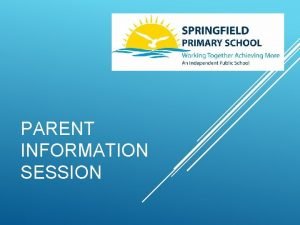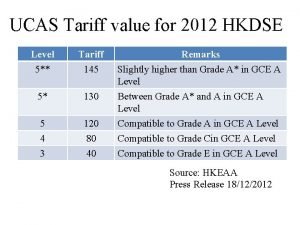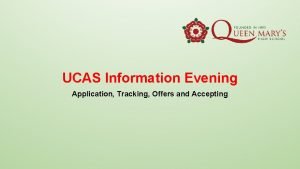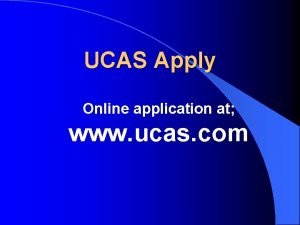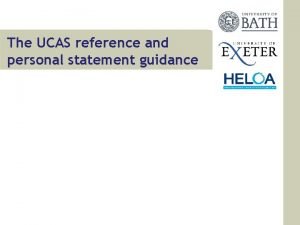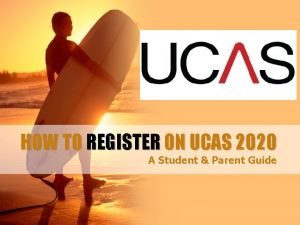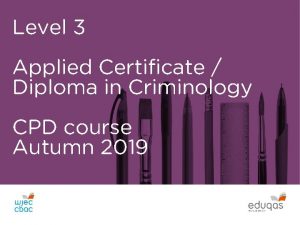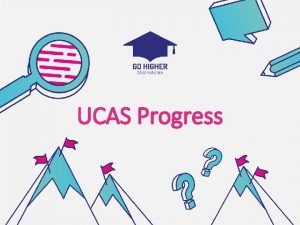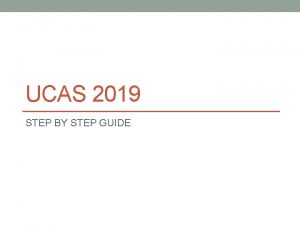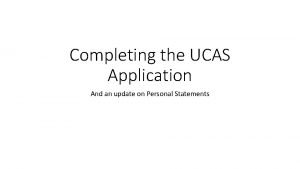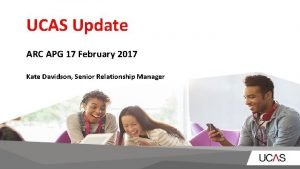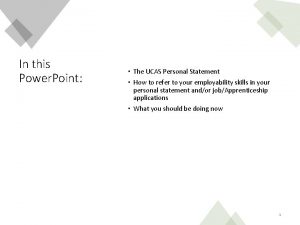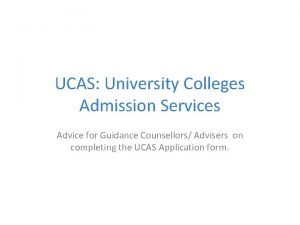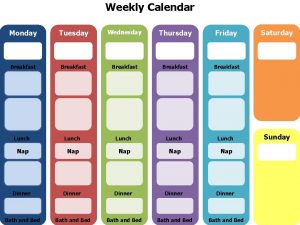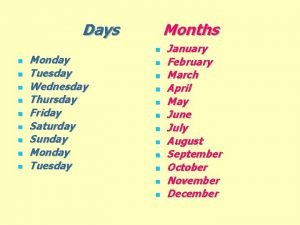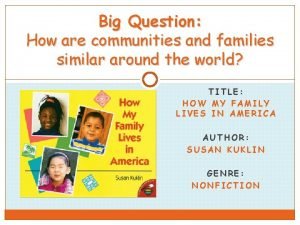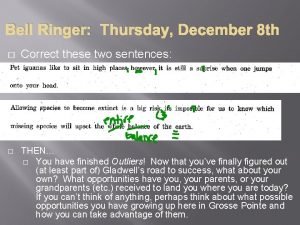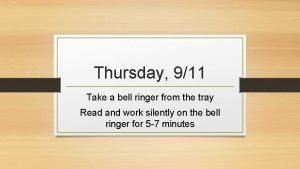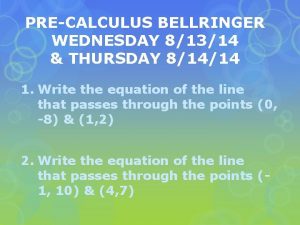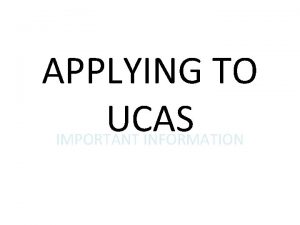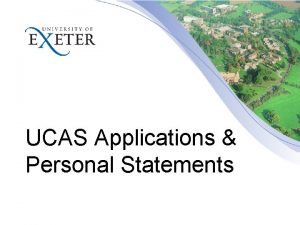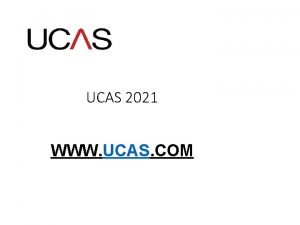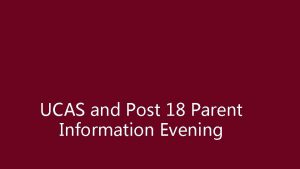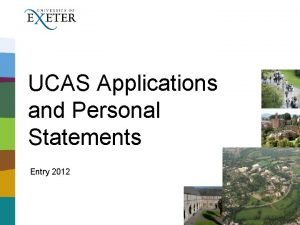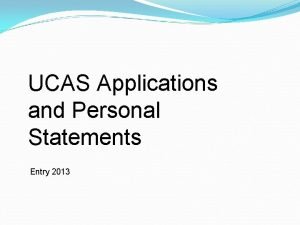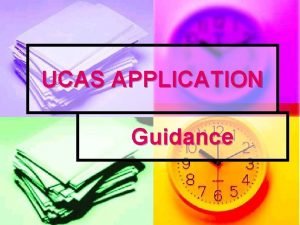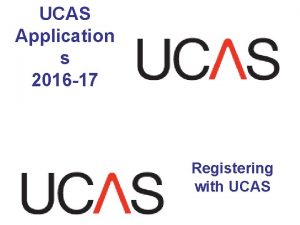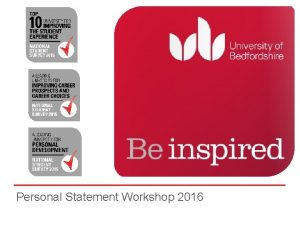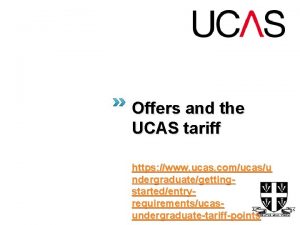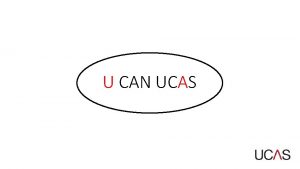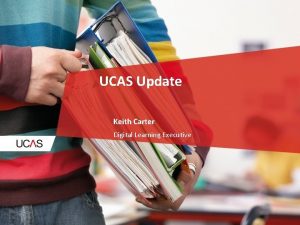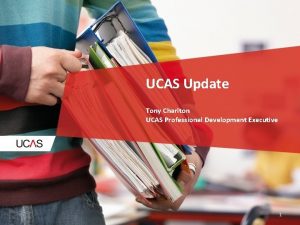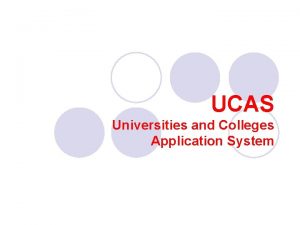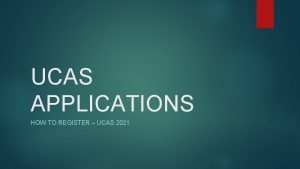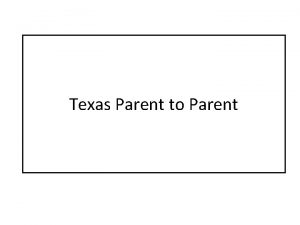Y 12 UCAS Parent Information Evening Thursday 6








































- Slides: 40

Y 12 UCAS Parent Information Evening Thursday 6 th July 2017

Overview 1. Year 12 Destinations work students have completed in College this year (and resources available). 2. What UCAS is and how it works. 3. What TCAS is and how it works. 4. Where students need to be now in preparation for applications next term.

1. Year 12 Destinations work students have completed in College this year (and resources available).

Year 12 Destinations 2017 Students working with mentors to organise work experience. Spring Term 2017 Year 12 Mentor Period Destinations Module 1. What are the 6 main options? 2. What are their entry requirements? 3. What are the advantages and disadvantages of each? 4. How to research courses / options available? 5. Aspirational / Status quo / Back-up options. Summer Term 2017 Year 12 Destinations Day 1. What are UCAS and TCAS? 2. How do they both work? 3. Advice for writing the personal statement.

Year 12 Destinations 2017 Resources? : - All resources from the Year 12 Spring Term Destinations Module and the Year 12 Destinations Day are available: 1. On the College CRL 2. On the College website 3. Available in hard copy to collect this evening.

By now… ? All students should … - Know whether they wish to apply to university next term. Most students … - Have a general idea of the types of courses and which universities they are interested in applying to. Some students … - Have begun to write their personal statements in preparation for their application next term.

2. What UCAS is and how it works.

www. ucas. com What is UCAS? • Universities and Colleges Admissions System • All students who apply for university must do so via the UCAS process.

UCAS Timeline – From now? Summer Term 2017 Year 12 Parents’ UCAS Information Evening - Introduce students and parents to UCAS process. - Students to continue researching and selecting courses. - Students to begin writing personal statements. Autumn Term 2017 UCAS applications Students to register with UCAS and apply

UCAS Timeline – Autumn Term Internal College Deadline External UCAS Deadline Wednesday 6 th September 2017 UCAS Applications for 2018 can be submitted from this point onwards. Friday 29 th September (two weeks before): Internal College deadline for medicine, dentistry, veterinary medicine/science and Oxford and Cambridge applications. Sunday 15 th October (6 pm) Application deadline for medicine, dentistry, veterinary medicine, veterinary science and Oxford and Cambridge. Friday 20 th October (day before half term): Internal College deadline for Russell Group applications as these are the most competitive courses and early entries get better results. Friday 1 st December (2 weeks before Christmas holidays): Internal College deadline for all university applications as early entries get better results. Monday 15 th January 2018 (6 pm) Application deadline for all courses except those above and Art and Design courses. Saturday 24 th March 2018 (6 pm) Application deadline for Art and Design courses.

How UCAS process works • It requires the students to: 1. Research and select universities and courses. 2. Write a personal statement about themselves. • It also requires the school to: 3. Put forward predicted grades for each student in their Year 13 courses. 4. Write an individual UCAS reference for each student.

1. Selecting universities and courses 1. Tariff points 2. How to research courses on UCAS 3. University prospectuses and Open Days

Entry Requirements / Tariff tables University Tariff Point tables Tariff Points A 2 Level 56 A* 48 A 40 B 32 C 24 D 16 E Please note that these are not incorrect even though the jumps between the grades is not always uniform. Tariff Points AS Level 20 A 16 B 12 C 10 D 6 E

Entry Requirements / Tariff tables University Tariff Point tables Tariff Points BTEC Diploma 112 D*D* 104 D*D 96 DD 80 DM 64 MM 48 MP 32 PP DOUBLE Award vocational courses Please note that these are not incorrect even though the jumps between the grades is not always uniform. Tariff Points BTEC Sub Diploma 56 D* 48 D 32 M 16 P SINGLE Award vocational courses

Researching courses on UCAS? • Home (www. ucas. com) ‘Search for courses’ ‘Select a course type’ ‘Undergraduate 2018 entry’ If you have some idea: Enter a subject. If you have no idea: Click on the ‘search’ icon.

Refining courses on UCAS? • This will take you to their new main search page. • - Available filters: What type of degree do you want to study? Where do you want to study? What subject(s) are you interested in? How do you want to study? How far do you want to search? Which location would you like to study in? • There is also a new ‘Map view’ function in the top righthand corner.

Some other recommended resources for choosing courses? UCAS ‘How To’ Guides – Choosing courses • https: //www. ucas. com/ucas/undergraduate/getting-started/ucasundergraduate-what-study The Complete University Guide – Choosing a course • https: //www. thecompleteuniversityguide. co. uk/courses/choosinga-course/ Which? University – Help I don’t know what course to choose • https: //university. which. co. uk/advice/choosing-a-course/help-idont-know-what-course-to-choose-what-do-i-do

University prospectuses and Open Days • There are many university prospectuses in the ‘Destinations’ bookcase in the Study Atrium. • However, these days most university prospectuses are easily downloaded or ordered online from any university website. • Open Days can be found at www. opendays. com

2. Writing Personal Statements 1. What are personal statements 2. Key tips, guides and support

Personal Statement: The basics • Attached to the UCAS application. • Read by university admissions officer(s). • Forms vital part of the evidence they use to decide whether to offer a place. • It is the only part of the application process written by the student. • 4000 characters or 47 lines. • It must answer the question: Why should YOU be given a place on this course?

Personal Statements - What have students done so far? 1. Personal Statement Ideas Generator pack 2. Top tips on how to write a personal statement 3. Personal statement exemplars 4. Started writing them 5. Ideally – students should aim to complete first draft before coming back in Autumn Term.

Personal Statements: What to include? Everything must be relevant to question: ‘Why should YOU be given a place on this course’? There is no ‘formula’ – it is a ‘personal’ statement. Everyone’s will be different.

Personal Statements: What to include? Nevertheless, the following areas are usually expected somewhere: -A short, strong opening paragraph. -A clear explanation of why you want to study this course. -Proven achievements that show you are capable of studying the course. -Evidence you have taken an interest in the course beyond the classroom. -Additional knowledge relevant to the course (e. g. other subjects? ). -Additional skills relevant to the course (i. e. ‘transferable skills’). -Enrichment activities relevant to the course.

Personal Statements: What to include? • 75% should be directly focused on your academic ability to study the course. • 25% should be focused on additional enrichment activities (and these should be made clearly relevant to the course).

6 Top Tips: • DO: 1. Research your chosen courses in detail. * Check the university website – many include what they are looking for in Personal Statements from their admissions tutors. - What specific topics do they include? - Which are compulsory? - What options do you have? Which would you pick? - Do they mention any particular skills you will need to have? - Do they mention what they are looking for in a candidate? - How are they assessed? Is it all exams? Is there an option to do a thesis?

6 Top Tips: • DO: 2. Be specific. *Give specific examples to support everything you say.

6 Top Tips: • DO: 3. Explain why everything you write is relevant to: ‘why should YOU be given a place on this course’? A – Action – what specifically have you done? Include DETAIL. B – Benefit – what have you gained or learnt from this? Be SPECIFIC. C – Course – how exactly does this then make you a good candidate for the course? Make sure it is RELEVANT.

6 Top Tips: • DO: 4. Lead with your strongest points. - Talk about your greatest achievements first, don’t leave them until last! - (It might be that an admissions tutor doesn’t get this far)

6 Top Tips: • DO: 5. Be unique (but not ‘weird’!) • What do you have to offer that no one else has? • What makes you stand out?

Top Tips: • DO: 6. Proof read your work. - Or ask a friend / relative to do it. - NO spelling mistakes - NO grammar mistakes

3. Predicted Grades 1. How these are set in College

Predicted Grades 1. Predicted grades in a subject are automatically set at the overall grade a student achieves at the end of Year 12. 2. If a student wants to increase this prediction by one grade only, they can complete a ‘Changing Predicted Grades’ form. 3. If a student wants the chance to increase this prediction by more than one grade, they must produce work to this standard in the same conditions they will be assessed in at the end of Year 13.

Changing UCAS predicted grades form • Predicted grades form part of a student’s UCAS application, forming part of the evidence that a university will use to decide whether or not a student is offered a place. • These grades must be a realistic reflection of what you believe a student truly has the potential to achieve overall in their A 2 result (taking account AS Level work, results and A 2 work and results). • If predicted too low, this will put the student at a disadvantage in their applications, but if predicted too high, runs the risk of students being rejected in the summer when they do not achieve this grade. • These grades, therefore, should be as aspirational as possible but also realistic, taking account of all factors – AS work, AS external results, A 2 work, A 2 internal results. Who to complete? Student Please complete: My overall AS result in this subject was: (If necessary) The grades I achieved in different N/A modules were: My concrete strategy for improving this grade this year N/A is: Tutor Based on the evidence above, I believe it is appropriate for this student to discuss the possibility of changing the initial predicted grade with their subject teacher. Subject teacher I have read the paragraph at the top of this form, and understand that this grade will be for the entire A 2 Level, and not only for my module. Subject teacher Based on all the evidence above, do you truly believe this student has the capacity to achieve a higher grade than initially predicted? YES / NO Subject teacher If you have answered ‘YES’, please indicate the predicted grade you will support: SFO / BNE / MCH / CTE Staff initial N/A I have reviewed all of the information, and am happy to approve a change to the predicted grade on the spreadsheet in the Achievement Director office (and initial it!)

4. UCAS References and TCAS 1. What is TCAS 2. How does it work

http: //tcas. toothill school. co. uk What is TCAS? • Torch College Application System • This is our internal College system where: - Students write drafts of their personal statements - Mentors collate the students’ UCAS references

http: //tcas. toothill school. co. uk Students: 1. Link to their mentor 2. Select universities and courses 3. Request subject references from teachers (which they can see) 4. Write personal statements on here (which the mentor can edit/make suggestions) Mentors: 1. Collate subject references once received to write UCAS References for tutees

What does it look like? • TCAS can be accessed from College or home. • Username: Usual student school email (sfox@toothillschool. co. uk) • Password: Usual student password • Username: TCASStudent • Password: tcas

Summary This is a long process which will last now until Christmas. • Now? : Students: 1. Decide if university is an option 2. Research and select up to 5 courses with a range of entry requirements: (Aspirational – the best I think I can possibly achieve; Status quo – what my teachers expect me to achieve; Back up – if I drop a grade in each subject). 1. Log on to TCAS and request subject references 2. Write as much of their personal statement first draft as possible Staff: 1. Writing subject references for mentors to collate in Autumn Term.

Where are the resources available? College noticeboard ‘Careers and Destinations’

 Cloud ninestiles
Cloud ninestiles Parent information session
Parent information session Ucas tariff points dse
Ucas tariff points dse Ucas progress
Ucas progress Https://www.gov.uk/apply-apprenticeship
Https://www.gov.uk/apply-apprenticeship Ucas,com
Ucas,com Ucas reference guide
Ucas reference guide Old ucas tariff
Old ucas tariff Personal statement oscar
Personal statement oscar Ucas register
Ucas register Wjec criminology level 3 ucas points
Wjec criminology level 3 ucas points Ucasis
Ucasis Ucas adviser
Ucas adviser Ucas deadline 2019
Ucas deadline 2019 Nominated access ucas
Nominated access ucas Ucas embargo
Ucas embargo Ucas
Ucas Ucas pointd
Ucas pointd Ucas
Ucas Conservatoires ucas
Conservatoires ucas 420 ucas points
420 ucas points Ucas for advisers
Ucas for advisers Thoughtful thursday morning message
Thoughtful thursday morning message Monday tuesday wednesday thursday friday calendar
Monday tuesday wednesday thursday friday calendar Thursday night prayer
Thursday night prayer Holy thursday (songs of innocence)
Holy thursday (songs of innocence) Blessed holy thursday
Blessed holy thursday Maundy thursday cartoon
Maundy thursday cartoon How's the weather answer
How's the weather answer Terrific thursday
Terrific thursday Thursday bellwork
Thursday bellwork Easter traditions uk
Easter traditions uk Whats the meaning of easter eggs
Whats the meaning of easter eggs Monday tuesday wednesday thursday friday saturday sunday
Monday tuesday wednesday thursday friday saturday sunday Monday question of the day
Monday question of the day Thursday bell ringer
Thursday bell ringer Thursday prayer images
Thursday prayer images Thursday prayer
Thursday prayer Thursday bell ringers
Thursday bell ringers Wednesday bellringer
Wednesday bellringer Welcome thursday
Welcome thursday

